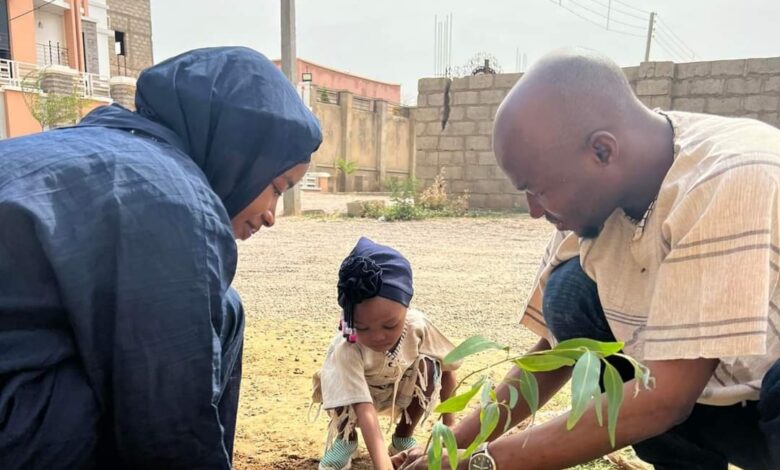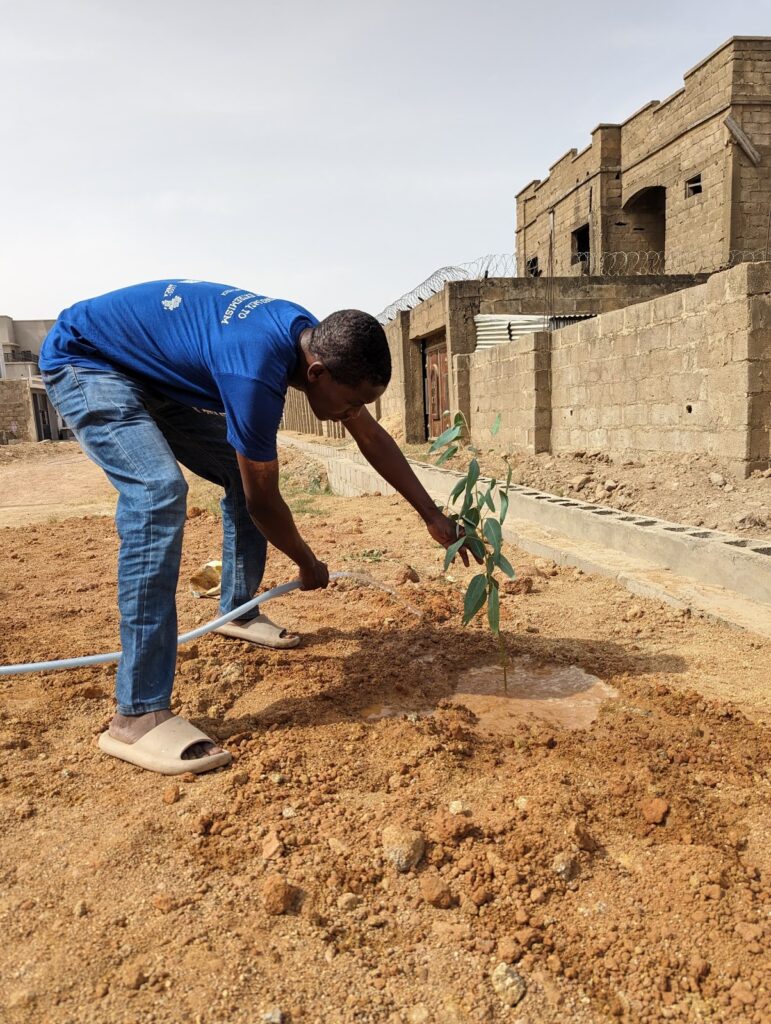Deadly Heatwave Inspires Tree Planting Initiative In Northern Nigeria
“We envision a society where every citizen takes responsibility for nurturing the earth, thereby obviating the need for external interventions.”

In the wake of a relentless heatwave engulfing some parts of Northern Nigeria, a grassroots movement has emerged, reviving the initiative of planting millions of trees across the region in order to restore its natural landscape and promote a healthier environment.
The initiative, led by passionate young climate activists and tens of volunteers, started as a social media campaign with “Make Kano Green” in 2019 and recently spearheaded a tree-planting programme across Northern Nigeria. The programme has reached 13 states in the Northwest and North Central of Nigeria, including Kaduna, Katsina, Kebbi, Nasarawa, Plateau, and Zamfara.
According to Isma’il Auwal, a climate advocate and a key figure in the initiative, the volunteers had many motivations, but key among them were religious duties and environmental protection. “In Islam, planting trees is considered worship and an act of charity,” he explained. “The Prophet Muhammad himself emphasised the significance of this act in his sayings.”
The incessant heatwave in the region, causing many towns to record unprecedented temperature increases, also made it more urgent for them to act.
Recent forecasts from the Nigerian Meteorological Agency (NiMet) show trends of heatwaves across the country, with people in many parts of northern Nigeria being susceptible to extreme danger that could lead to heatstroke, muscle cramps, and exhaustion. States like Abuja, Adamawa, Kano, Katsina, Kebbi, Kogi, and Sokoto are said to face the harshest weather conditions, with temperatures rising as high as 40°C — a situation that could persist until May.
“The oppressive heat has become unbearable, compelling us to take action rather than merely lamenting the situation,” Auwal said. He knows the trees will only become beneficial after their growth, which may take some years. Regardless, he believes it’s better to start now.
Auwal had raised money for seedlings through crowdfunding on social media and says the goal is to plant a million trees across Nigeria’s 19 northern states.

Make Kano Green has received support from various quarters. While primarily reliant on individual donations, especially on social media, the initiative has also received contributions from corporate entities such as Confo and Forte GCC Innovative Solutions.
Confo donated 1000 seedlings, while Forte GCC provided 200 seedlings equipped with barricades, underscoring the growing recognition of the importance of environmental conservation among businesses. Other small companies and startups are expected to join the trend.
Strategic partnerships have also been established with key stakeholders, including the Kano State Police Command. Auwal revealed that the initiative has collaborated with the police to distribute seedlings to all 78 police stations, 11 area commands, two mobile squadron commands, the headquarters, and all police barracks in the state.
Looking towards the future, Make Kano Green aims to expand its reach and impact. Auwal stresses that the movement’s overarching objective is to foster a culture of environmental responsibility and inspire people to take ownership of the trees.
“Our main goal is to instil a sense of ownership and accountability among individuals,” he states. “We envision a society where every citizen takes responsibility for nurturing the earth, thereby obviating the need for external interventions.”
The journey is, however, not without its challenges. Chief among them is the overwhelming demand for seedlings amid a limited supply.
“Despite the generous donations we’ve received, including over 6,000 seedlings within 24 hours, the demand continues to outstrip supply. We’ve received a total donation of 10,865 seedlings but currently have fewer than 20 remaining,” Auwal noted.
Navigating water scarcity in Kano poses another obstacle, prompting the initiative to adopt a targeted approach. As the rainy season approaches, the trees planted have been assigned to the houses on the streets to nurture their growth.
Auwal explained, “We prioritise planting in individual homes and businesses that demonstrate a commitment to nurturing trees. By focusing on engaged community members, we ensure that each tree has the best chance of survival amidst challenging environmental conditions.”
Make Kano Green envisions a future where environmental consciousness pervades every aspect of society. Auwal sees a future of a transformed landscape in Northern Nigeria, where trees flourish and communities live in perfect harmony with nature.
“In five years’ time, we hope to witness a paradigm shift, with individuals taking proactive steps to plant trees in their communities, cities, and villages,” he said.
But the biggest challenge is from those who remove trees for fuel and other things.
“Our ultimate goal is for the government to enforce sanctions against those who recklessly destroy trees, thereby safeguarding our natural heritage for generations to come.”
Muhammad Aliyu, who planted five trees in front of his house, said he has already devised a plan that will ensure the growth of the trees by next year.
“I have two children, and I have already given them the trees and asked them to take care of them because they are theirs,” he said, explaining that giving children a sense of ownership motivates them and instils a culture of climate protection.
Meanwhile, the Kano State government has also started planting trees on the streets to create avenues across the 44 local government areas.
Flagging off the event at a ceremony in April, Governor Abba Kabir Yusuf planted the first of the three million trees by the Government House in Kano.
“The largest share of about 1.5 million will be distributed and planted across major streets in the eight metropolitan local government areas,” he said.
Support Our Journalism
There are millions of ordinary people affected by conflict in Africa whose stories are missing in the mainstream media. HumAngle is determined to tell those challenging and under-reported stories, hoping that the people impacted by these conflicts will find the safety and security they deserve.
To ensure that we continue to provide public service coverage, we have a small favour to ask you. We want you to be part of our journalistic endeavour by contributing a token to us.
Your donation will further promote a robust, free, and independent media.
Donate HereStay Closer To The Stories That Matter




